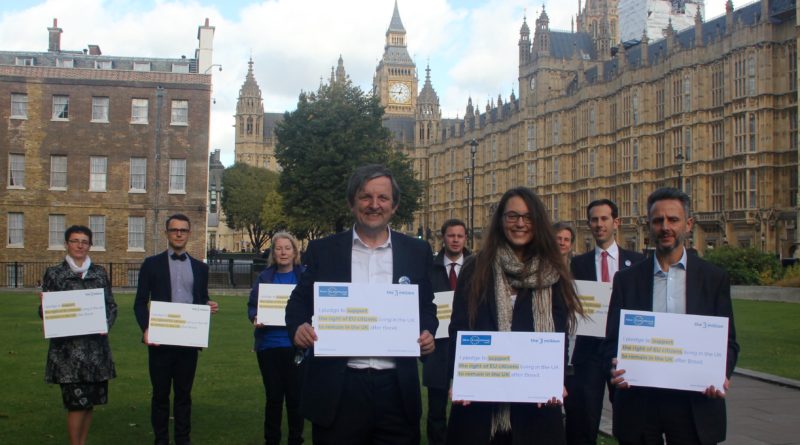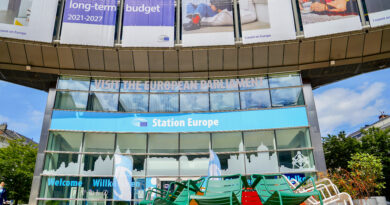Calls mount to guarantee rights of EU citizens before Brexit negotiations
In his tour of European capitals Michel Barnier, the former French foreign minister who leads the European Commission Brexit task force, said that negotiations with Britain will cover only four points. The status of EU citizens living in the UK and of Brits in other EU countries will be one of them. Campaigners would rather settle these before the formal start of the talks.
The four key points the Commission task force is preparing for, writes Politico, are the UK contribution to ongoing EU programmes and payment of other liabilities (like EU staff pensions), administrative matters such as the future of EU agencies based in the UK, arrangements for Northern Ireland and Gibraltar, as well as the status of EU citizens in Britain and British in the EU.
Campaigning groups, however, fear that if people’s rights are not secured before Article 50 is triggered and negotiations formally begin, they could be used in exchange for other requests, for example in relation to access to the single market. At the Conservative party conference earlier in the month, the UK Secretary of State for International Trade Liam Fox said that the status of EU nationals in the UK is “one of the main cards” in talks with the European Union.
An attempt to pass a motion in parliament that would guarantee existing rights was voted down last Thursday. The proposal put forward by the SNP was supported by the oppositions but was rejected with 293 votes to 250. Almost all Conservatives voted against, claiming the motion did not mention the rights of British citizens in other EU countries.
“Thursday’s debate highlighted the dividing line between those who want Britain to lead by example and grant EU citizens in the UK their residency rights now and those who want to wait for the Brexit negotiations and reciprocal guarantees for Brits in the EU. But this in effect will turn EU citizens into bargaining chips and allow the xenophobic race and hate crime to continue to escalate,” commented Roger Casale, founder and CEO of New Europeans, an organisation that promotes freedom of movement.
New Europeans joined the3million and Fair Deal for Expats, groups that support the rights of EU nationals in the UK and Brits in the EU, in a campaign asking Member of Parliament to safeguard people’s rights and avoid years of uncertainty. They call for unilateral action from the UK and ask the same of EU governments, before Article 50 is triggered.
“There is a widespread feeling among EU citizens that we have been unfairly treated since the referendum. The rise in hate crimes towards us and the insistence of the government to consider us as bargaining chips in the future Brexit negotiations has created unprecedented anguish and anxiety in our communities,” said Nicolas Hatton of The 3 Million.
Several EU nationals have been writing to their MPs to express concern and frustration. “I am not at fault that the UK decided to leave the EU. I am not at fault if the EU doesn’t give you the deal you want for your country. But I came to this country legally. The UK agreed to the European treaties rights and have been benefitting from it too,” wrote one of the members of The 3 Million Facebook group.
Another group, A Fair Deal for Poles in the UK, took a similar initiative and wrote an open letter to British Prime Minister Theresa May. “The UK government cannot blame EU governments for this uncertainty. It was the British people who chose to leave the EU and not the other way around, so the onus is on the British government to act first. It is shameful that Polish children who considered the UK their home should be treated by the UK government as hostages in long term negotiations with the EU,” says the letter.
The Ambassadors of Poland and Romania also called for clarity for the future of EU citizens during their intervention on Tuesday at the House of Lords EU Justice Sub-Committee.
On Thursday 20 October the French Assembly held a round table to discuss British citizens’ rights post-Brexit. Britons in France fear they will lose free movement rights once the UK leaves the EU. They called for a fast-tracked process to acquire French citizenship. Like EU nationals in the UK, they face uncertainty on issues such as access to healthcare, pensions and rights to vote in local elections. In France, healthcare is a major issue as many British pensioners live in the country.
The problem of the new status caused by Brexit concerns some 3 million EU citizens in the UK and 1.3 million British citizens in the EU. Unless they had acquired British citizenship, EU nationals could not vote in the EU referendum and British citizens abroad could vote only if they had been living out of the country for less than 15 years. During the referendum campaign all parties said nothing would change as a result of the vote.
Claudia Delpero
Photo: New Europeans and The 3 Million campaigners launching the pledge in Westminster, London. © All rights reserved.





